


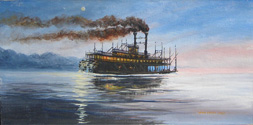


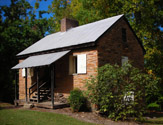









Southern Exposure
Ashley Cleveland
Communicating Deep, Profound Things With Just a Few Words
Communicating Deep, Profound Things With Just a Few Words
With two Grammy awards, two Dove awards and one Nashville Music Award to her credit, Nashville singer-songwriter Ashley Cleveland is one of Christian music's most formidable artists.
However, in spite of touring with performers like the late Rich Mullins and the platinum-selling band, Jars of Clay, Ashley Cleveland may not be a household name among fans of Christian music. Nonetheless, those that hear her perform---especially live---are so captivated that they inevitably become perhaps her most valuable tools of promotion. Singer Amy Grant even once proclaimed on a Dove Awards broadcast that she would get to sing like Ashley Cleveland when she made it to Heaven. Sadly, there are some who are only vaguely familiar with Cleveland and quite possibly have no clue who she is---especially if they rely on some contemporary Christian radio stations (like my local station which feels compelled to play the same ten or twelve artists!) to enlighten them.
Even if you have never heard of Ashley Cleveland, chances are you have heard her. An in-demand background vocalist for some of the music industry's hottest acts, Cleveland has sung backing vocals for a broad spectrum of recording artists including Faith Hill, Johnny Cash, Don Henley, Etta James, Johnny Van Zant, Russ Taff, Emmylou Harris, Rodney Crowell, Clay Crosse, Martina McBride, Steven Curtis Chapman, John Hiatt, Michael English, Trisha Yearwood, Rich Mullins, Reba McIntire, Mac Powell, Kim Hill, Edwin McCain and Marcus Hummon.
However, in spite of touring with performers like the late Rich Mullins and the platinum-selling band, Jars of Clay, Ashley Cleveland may not be a household name among fans of Christian music. Nonetheless, those that hear her perform---especially live---are so captivated that they inevitably become perhaps her most valuable tools of promotion. Singer Amy Grant even once proclaimed on a Dove Awards broadcast that she would get to sing like Ashley Cleveland when she made it to Heaven. Sadly, there are some who are only vaguely familiar with Cleveland and quite possibly have no clue who she is---especially if they rely on some contemporary Christian radio stations (like my local station which feels compelled to play the same ten or twelve artists!) to enlighten them.
Even if you have never heard of Ashley Cleveland, chances are you have heard her. An in-demand background vocalist for some of the music industry's hottest acts, Cleveland has sung backing vocals for a broad spectrum of recording artists including Faith Hill, Johnny Cash, Don Henley, Etta James, Johnny Van Zant, Russ Taff, Emmylou Harris, Rodney Crowell, Clay Crosse, Martina McBride, Steven Curtis Chapman, John Hiatt, Michael English, Trisha Yearwood, Rich Mullins, Reba McIntire, Mac Powell, Kim Hill, Edwin McCain and Marcus Hummon.
Additionally, Cleveland duetted with Gary Chapman on the Dove-winning album, Songs from the Loft and, teaming up with Michael Tait of dcTalk fame, she recorded "Salt and Light" for the much talked about Roaring Lambs project. Another memorable duet resulted when Cleveland joined blue-eyed soul singer Bryan Duncan on his foot-stompin' recording of "Clap Your Hands."
In addition to her passionate, soulful voice, Ashley Cleveland is a gifted songwriter, and it comes as no surprise that other artists have opted to perform or record her tunes. If you are among the millions of faithful viewers who have made Fox's American Idol a rousing success, you probably witnessed contestant Nadia Turner deliver a commanding performance of Cleveland's "Power of Love" during the program's fourth season. For her Christmas project, country star Trisha Yearwood recorded Cleveland's "Take a Walk Through Bethlehem." And the Gaither Vocal Band, a decidedly southern gospel act, recorded "He Came Through" (a song written by Cleveland, Walter Wilson, Russ Taff and James Hollihan) on their Grammy-nominated project, Everything Good.
In addition to her passionate, soulful voice, Ashley Cleveland is a gifted songwriter, and it comes as no surprise that other artists have opted to perform or record her tunes. If you are among the millions of faithful viewers who have made Fox's American Idol a rousing success, you probably witnessed contestant Nadia Turner deliver a commanding performance of Cleveland's "Power of Love" during the program's fourth season. For her Christmas project, country star Trisha Yearwood recorded Cleveland's "Take a Walk Through Bethlehem." And the Gaither Vocal Band, a decidedly southern gospel act, recorded "He Came Through" (a song written by Cleveland, Walter Wilson, Russ Taff and James Hollihan) on their Grammy-nominated project, Everything Good.
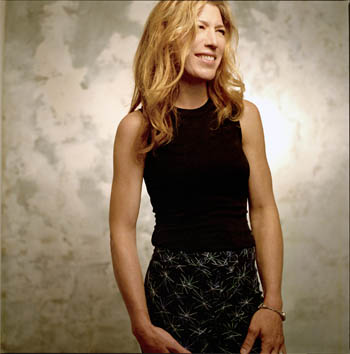
www.AshleyCleveland.com
Ashley Cleveland's Discography:
Ashley Cleveland's Discography:
- Before the Daylight's Shot (2006, 204 Records)
- Men and Angels Say (2005, Rambler Records)
- Second Skin (2002, 204 Records)
- You Are There (1998, Cadence Communications, 204 Records)
- Lesson of Love (1995, Reunion Records)
- Bus Named Desire (1993, Reunion Records)
- Big Town (1991, Atlantic Records)
Recently, I chatted with Ashley Cleveland about her life and career. Clearly impacted by the American South, the singer candidly discusses her Southern roots. More importantly, she shares how God has transformed her. Years of oppression and addiction were overcome with the redemption and freedom that only Jesus Christ can provide. Hers is quite a story. Following is our conversation:
Greg Freeman: As I've said before, I wish to use Southern Edition as an avenue through which I can expound on the people and places of the South. With Knoxville and Nashville connections, your story is geographically relevant, but your music reflects some obvious southern influences, too. Where specifically did you grow up, and what roles would you say the South might have played in shaping who you are and the kind of music you perform?
Ashley Cleveland: I am originally from Knoxville, Tennessee. My parents divorced when I was quite young. My mother moved to the San Francisco Bay area, and I went with her. I would spend school years in that part of the country, and in the summers I would be with my dad. I'm from an old Southern family, and I think that figures very heavily into how I write. In the South, you know church, for most people, figures somewhere. I think it was many years before I began to have a deep enough personal faith where that became important for me to write about, but that element of faith was always part of my life, and I think, in good ways and bad ways, that's part of my southern heritage. In a good way, just that it was . . . that it existed. And in a bad way, you know a lot of . . . many, many people attend church in the South that have no idea that it's possible to have a personal encounter with the Lord. And many people attend church that have no faith at all, really. It's more social or it's more about their position in the community or whatever. Certainly, that had its place in my own family in a way, although many of my family members were devout believers. Fortunately, my mother was one of them. I think her prayers for me were very pointed and helpful. Growing up in two so decidedly, distinctly different cultures had as much impact on me as anything. Knoxville certainly was not a progressive southern city, and to go to probably the most progressive area in the country in a way had a profound impact on me, but I have to say, as soon as I was able, I high-tailed it back to the South.
Greg: Obviously, from some rousing soul to some intense righteous rock & roll, you've got a voice and a sound that I would say reflects a little bit of pop, southern rock, black gospel and some blues. Who were some of your early music influences?
Ashley: My primary influence, oddly enough, was Neil Young and that whole era in the '70s. Starting with the Beatles, and then moving into the early '70s acoustic bands like Crosby, Stills and Nash. There was that whole group of people that was---um, Bonnie Raitt out of the Northeast and various other artists---kinda congregating in California. And I was also deeply influenced by the British invasion. Bands like the [Rolling] Stones. And people like Van Morrison, Joni Mitchell and the confessional artists had a huge impact on the way I write songs. And I liked all the soul singers quite a bit. I listened to a lot of Stevie Wonder and Aretha Franklin and Motown. Of course, every generation thinks their music is the finest, but I'm pretty convinced that mine was in my era. It was a very musically rich era, and there was always somebody new doing something that nobody else had done. So, there was much to be influenced by and inspired by. I kinda took it all in. I was a great fan for many years before I was ever an artist.
Greg: Was pursuing a career in music a childhood dream or is it something that just manifested as you grew older?
Ashley: Well, I started playing when I was a teenager, like around 15. And I think from the moment I discovered music, it was the one thing in my life that I felt like I could do well and it became an immediate passion. I don't know if I articulated a career path at that point, but I definitely knew that all I wanted to do was play music. Let's put it that way. That attitude prevailed, and I did a little bit of college, but I was forever missing classes 'cause I was out playing in the clubs at night. My education had a lot to do with learning how to play the music and perform.
Greg: Now, how did you get your start in the business. I know that everyone has a story. For some it's about meeting just the right person. For others, it's about getting out there and playing night after night after night 'til finally you beat some doors down. What worked for you?
Ashley: I went to the University of Tennessee in Knoxville. There were a lot of little music clubs up and down the little strip that ran through campus. I was in one of them one night, and I heard this girl singing and walked into the back room where they had music, and it was a girl named Pam Tillis, and we became fast friends. She was from Nashville. Her father is Mel Tillis. She was from a country music dynasty, and we formed a little folk duo, and played music together for the whole school year. Then, she went back to Nashville, and I went to California, and continued playing up and down the Northern California coastline as a solo artist. Just playing in clubs, just playing other people's songs. It was from my exposure to her that it occured to me that maybe I could write songs. She was writing songs when I met her. So, I got the idea that maybe I could write songs, too, and I started experimenting with that. We stayed in touch, and it became obvious to me that if I was going to do anything in music I was gonna need to move to an industry town. And really there are only three of them. One is Los Angeles, one is New York and one is Nashville, and, of the three, Nashville just seems the friendliest to me personally. It was in the South and it was very close to my hometown, and I needed to be there. It didn't seem like [living there] would be [at a ] prohibitive cost. Really, I knew next to nothing about country music. I'm not a country music artist, and I was very ignorant about the industry itself. I just thought you go where the industry is and they do all of it, and I didn't realize I was moving to a country music town, but it actually worked out. That's how I got started. I came here and ultimately got a publishing deal with Warner Chappel Music. And they let me demo all the songs that I had written and started helping me. I had a manager who started shopping those demos to various record labels, and Ahmet Ertegun at Atlantic Records in New York liked 'em and signed me.
Greg: You led right into my next question. I know early on you were signed to some major labels, but lately you've recorded independently, and you've produced your projects with your husband, Kenny Greenberg. Do you find that this is better suited to your career? Does it give you more artistic freedom? Or, is it still a bonus to have a major label backing you?
Ashley: Well, I think that there are pros and cons either way. Doing it ourselves, really, that was the first time I ever made any money. So, there's that, but it's always great if people really have a plan and a deep interest in doing my music some priority. If someone came along tomorrow and offered me a deal, I would probably take it because there's strength in numbers. It's good to have a team. But the rise of my career coincided with the fall of the music industry in many ways. Working in what we here in Nashville refer to as the incredible shrinking business. You know, at one point, I was on three different major labels, and two different Christian labels, but then there came a point where no label was stepping up to the plate to sign me. We did this because nothing else had presented itself, and I felt like I wanted to move forward. Fortunately, we had the wherewithal to be able to record a record and to continue on, and it actually worked out well.
Greg: I might interject here that I think your recent records are perhaps some of your very best.
Ashley: Well, Thank you.
Greg: And I know that, of course, you guys have had probably a greater hand in that than in the early stuff, I would assume.
Ashley: Well, we're not trying to please anybody. I'm not trying to please anybody but myself and my fans. I think when I look at my career, the mistakes that I have made usually have a lot to do with trying to chase after something that I wasn't exactly sure what it was I was chasing, and trying to please a market that I wasn't even sure I was suited for. I certainly went through that to some extent. Now at the end of the day, Greg, if I'm not having a good time doing this then I really need to do something different. So, when I make a record, it's for the joy of making music. And that's about it. And to take that music to the people that I have access to, that I can play to and communicate that music to has been a real privilege. Really, at the end of the day the two things that have been the most satisfying things about my career have been: a) that I spent my life doing something that I deeply loved doing, and b) that I was able to have a sizable group of people respond to that. And what a gift that has been to me. So, these days it's just about the music and the fans.
Greg: I know, as an artist, you've got to create for your own sanity, and, as a Christian, you have a message to convey. I've noticed that in your songs you really don't mince any words about struggles and failures and redemption. I see you as very authentic . . . maybe even unashamed to just be honest and transparent. Obviously, you're not echoing the sentiments of the self-righteous and the holier than thou. Could you share your testimony and tell me how God has transformed your life?
Ashley: Well, I'm a recovered alcoholic and drug addict. I came very close to destroying myself with substance abuse and became very ill with it, really. And, really, in the process . . . in that kind of descent into hell . . . I kinda came to the end of myself which was a longer journey than I wish it had been. But, you know, it takes what it takes. I really feel like I encountered not the God of my upbringing, not the God of Southern culture, not the God of my parents, but the God who is. And the God that I encountered in the most wasted place in my life---where I literally had less than nothing to offer---was so kind and so tender towards me that I thought, "You know, I can't help but respond. If this is who you are, then I'm in." My testimony is that. There's certainly more. That's the soundbyte of a testimony. That's really the crux of it. I see myself as a career artist, more of a singer-songwriter, but I don't, to be honest with you, feel like the primary motive is the message of the music. I write about my faith because I find that to be the most compelling thing to write about in life, but it's not the only thing. I think everything is under the umbrella of faith. Sometimes I write very specifically about my faith. Other times I write a love song. Other times I write about something else. It's all fair game to me, but I write about the Lord---the evidence of him in my life---because that's what I'm passionate about. And I write about my own frailty because that's what I know about. I'm a broken person, and I feel that one of the things that Christians do to their own disservice is pretend that they're not broken anymore. And they think that serves the Lord well. But I think truth is the thing that serves the Lord well. Today, maybe there are people that aren't broken. I just don't know any of them.
Greg: Personally, I don't either. I think we can get so caught up in putting up a facade sometimes because we think that's what is acceptable for a Christian, but that's not being real. The reality is, we have to rely on God, not only for sustenance, but just to get us through those times that would tear down the weak. I totally see what you're saying. I know you have written a lot of songs about various things, and I think writers and artists who limit themselves sometimes aren't being true to their craft. Obviously, you've branched out there and expressed yourself, and quite well, I might add. In 2006, of course, you released Before the Daylight's Shot. I think that's your seventh solo project?
Ashley: Yes.
Greg: I've listened to it, and I love the project. You've got everything from the contagious "Queen of Soul" to songs like "Deeper Walk" which I would dare say is probably one of the most spiritually emboldening songs I've heard you sing in a long time.
Ashley: Which one?
Greg: "Deeper Walk."
Ashley: Oh, yeah. I love that one.
Greg: And I would also say that when you put your pen to paper and begin to write, there seems to be a great deal of depth to your songs. They provoke a lot of thought. Have you found that there is a greater sense of maturity in your writing as the years have gone by?
Ashley: Well, you hope for that. I think just as a songwriter and as a communicator, I think I'm a better writer than certainly I was when I started. I think my goal was to learn how to say what it is and be more economical with my words. When I moved here, I had a wonderful publisher who has since died. He was really one of the most artistic people on the other side of the desk, on the business side here in Nashville. And he was responsible for so many. He signed Jimmy Buffet to his first record deal, and Three Dog Night to their first record deal. And he was just a great champion of artists and people with a real unique perspective. He really was a lover of songs and understood what a great song was all about, and one day he looked at me after I had just played him a new song and said, "Ashley, nobody's interested in your second page of lyrics." I would just go on and on, and I'd have verse after verse after verse, and you know that kinda stuck with me. I thought some of the writers that I admire most are able to communicate very deep profound things in very few words. For some reason, that just resonated with me. Certainly, there are people like Bob Dylan, for instance, who use a lot of words and say things very, very well. So, that's not a rule. Rules in songwriting are designed to be broken, in my opinion, but for me personally my desire has been to figure out how to say what I want to say without a lot of verbage.
Greg: Reflecting on your career thus far, I guess in an industry town like Nashville things are so volatile. Sometimes they change with the seasons, so to speak. In your career, I would say there have even been a few interesting contrasts. I know your projects have received a lot of critical acclaim, but yet that one year you decided to record a song by the name of "Skin Tight," and you took a little heat for that.
Ashley: Yes, I did.
Greg: You've won two Grammys, but yet a few people have pointed out that your record sales have not measured up to what might be considered very commercially successful.
Ashley: Right.
Greg: Do you attribute these contrasts or contradictions to the unpredictable nature of the industry or do you think it might be that God has just led you to some various junctures where he specifically wanted you (if maybe just for a moment or a season) so you could make the greatest impact right then and there?
Ashley: You know that's a great question, and the truth of the matter is it's something that I've reflected on. And the truth of it is, I have no idea. I think what I reflect on more (rather than has God led me here, although I certainly believe that he could have and perhaps he did), is I've always felt like the Lord wasn't so interested in the specifics, but just how I played the hand that I got dealt. And I haven't always played the hands very well. I've had a lot of struggle. Things haven't [always] gone well, and I've had a hard time accepting certain things. But you know over the years I really have accepted the career hand I was dealt because I've seen great beauty in it, and I know I've had an opportunity to speak into lives, and to be part of that. I don't know what's ahead, but I'll tell you this. If it all ended today, I would look back and consider that I've had a great career. And the other side of it is knowing how I am, knowing who I am in a way. Had I been given more of a career, that might have destroyed me. I don't know that I have the ability to handle that. To be honest with you, I don't know a single person that has had huge fame where it's really enhanced who they were. People weren't designed to be adored on that level or idolized or whatever you want to call it. You know, the Lord is the only one who should be adored and worshiped. Not people. And when you put them in that elevated position of power, it wrecks 'em, in my opinion, and it certainly would have wrecked me. I think it would have brought out the most insufferable qualities that I have which are alive and well anyway. So, I think about that. The other side of it is, in order to have a successful musical career, you need to be traveling, and you need to be traveling quite a bit. Very few people have a successful musical career without going places on a regular basis. Men, in some ways, are able to get to do that, although I don't think in any way that their marriages don't risk suffering like women do, but it would have been very hard for me to walk off and leave my children and stay on the road. It would have been unfair to deal out a gypsy life to them. They were quite portable when they were little, and I did take advantage of that and I took them with me, but they reach a place where they're building their own lives and their own community. They don't want to go on the road. I think some people have really dealt with that issue admirably, but I think, in a way, it's a blessing that I got to have what everybody wants . . . which is a strong marriage and healthy kids. I think, "Man, I'll trade the big career for that any day." And I got to have it. You look at life, and you look at just how hard life is and how much sadness is in the world and you begin, at least I have, to feel so blessed. I need to feel nothing but gratitude, man.
Greg: That's awesome. You've been a wife and a mother, and you've impacted many lives with your music career in spite of not touring ten months out of the year. Let me just say that I enjoy every record you produce.
Ashley: Thank you.
Greg: And your music certainly speaks to me. When I met you in Nashville in 2000, I had no clue I'd be interviewing you some seven years later. So, this has been a joy.
Ashley: That's great. What a thing!
Greg: I do appreciate your taking the time to talk with me and, of course, I wish you nothing but the best in the future.
Ashley: Thank you, Greg.
Greg: And I'm already looking forward to the next album!
Ashley: Well, that's just great. Thank you so much. Thanks for including me.
Greg: I'm glad to. I may not be Time magazine, but I do have a small following.
Ashley: Hey man, I'll bet you do. It's great. I'm really happy to get to be a part of that.
Greg: Thank you very much, and it's great to talk with you again.
With that, Ashley and I concluded our conversation. She had kids to pick up, and I had errands to run.
My final thoughts? I know that we, as fans of musicians, actors and athletes, can often hold an individual in high esteem. Certainly, our opinions are subject to change---especially if we are ever given a chance to meet that person and engage in real conversation. After all, some merely display a facade, allowing only a select few to ever encounter their true personas. Ashley Cleveland, my friends, is genuine, and I only wish that everyone, particularly every singer, movie star, comedian and star athlete, could possess that quality.
In addition to her genuineness, Ashley Cleveland has the vocal prowess and articulate penmanship that enable her to make a lasting impression with her music. Best of all, she has a lot to say, but doesn't have to say a lot to convey what is on her mind and in her heart.
Greg Freeman: As I've said before, I wish to use Southern Edition as an avenue through which I can expound on the people and places of the South. With Knoxville and Nashville connections, your story is geographically relevant, but your music reflects some obvious southern influences, too. Where specifically did you grow up, and what roles would you say the South might have played in shaping who you are and the kind of music you perform?
Ashley Cleveland: I am originally from Knoxville, Tennessee. My parents divorced when I was quite young. My mother moved to the San Francisco Bay area, and I went with her. I would spend school years in that part of the country, and in the summers I would be with my dad. I'm from an old Southern family, and I think that figures very heavily into how I write. In the South, you know church, for most people, figures somewhere. I think it was many years before I began to have a deep enough personal faith where that became important for me to write about, but that element of faith was always part of my life, and I think, in good ways and bad ways, that's part of my southern heritage. In a good way, just that it was . . . that it existed. And in a bad way, you know a lot of . . . many, many people attend church in the South that have no idea that it's possible to have a personal encounter with the Lord. And many people attend church that have no faith at all, really. It's more social or it's more about their position in the community or whatever. Certainly, that had its place in my own family in a way, although many of my family members were devout believers. Fortunately, my mother was one of them. I think her prayers for me were very pointed and helpful. Growing up in two so decidedly, distinctly different cultures had as much impact on me as anything. Knoxville certainly was not a progressive southern city, and to go to probably the most progressive area in the country in a way had a profound impact on me, but I have to say, as soon as I was able, I high-tailed it back to the South.
Greg: Obviously, from some rousing soul to some intense righteous rock & roll, you've got a voice and a sound that I would say reflects a little bit of pop, southern rock, black gospel and some blues. Who were some of your early music influences?
Ashley: My primary influence, oddly enough, was Neil Young and that whole era in the '70s. Starting with the Beatles, and then moving into the early '70s acoustic bands like Crosby, Stills and Nash. There was that whole group of people that was---um, Bonnie Raitt out of the Northeast and various other artists---kinda congregating in California. And I was also deeply influenced by the British invasion. Bands like the [Rolling] Stones. And people like Van Morrison, Joni Mitchell and the confessional artists had a huge impact on the way I write songs. And I liked all the soul singers quite a bit. I listened to a lot of Stevie Wonder and Aretha Franklin and Motown. Of course, every generation thinks their music is the finest, but I'm pretty convinced that mine was in my era. It was a very musically rich era, and there was always somebody new doing something that nobody else had done. So, there was much to be influenced by and inspired by. I kinda took it all in. I was a great fan for many years before I was ever an artist.
Greg: Was pursuing a career in music a childhood dream or is it something that just manifested as you grew older?
Ashley: Well, I started playing when I was a teenager, like around 15. And I think from the moment I discovered music, it was the one thing in my life that I felt like I could do well and it became an immediate passion. I don't know if I articulated a career path at that point, but I definitely knew that all I wanted to do was play music. Let's put it that way. That attitude prevailed, and I did a little bit of college, but I was forever missing classes 'cause I was out playing in the clubs at night. My education had a lot to do with learning how to play the music and perform.
Greg: Now, how did you get your start in the business. I know that everyone has a story. For some it's about meeting just the right person. For others, it's about getting out there and playing night after night after night 'til finally you beat some doors down. What worked for you?
Ashley: I went to the University of Tennessee in Knoxville. There were a lot of little music clubs up and down the little strip that ran through campus. I was in one of them one night, and I heard this girl singing and walked into the back room where they had music, and it was a girl named Pam Tillis, and we became fast friends. She was from Nashville. Her father is Mel Tillis. She was from a country music dynasty, and we formed a little folk duo, and played music together for the whole school year. Then, she went back to Nashville, and I went to California, and continued playing up and down the Northern California coastline as a solo artist. Just playing in clubs, just playing other people's songs. It was from my exposure to her that it occured to me that maybe I could write songs. She was writing songs when I met her. So, I got the idea that maybe I could write songs, too, and I started experimenting with that. We stayed in touch, and it became obvious to me that if I was going to do anything in music I was gonna need to move to an industry town. And really there are only three of them. One is Los Angeles, one is New York and one is Nashville, and, of the three, Nashville just seems the friendliest to me personally. It was in the South and it was very close to my hometown, and I needed to be there. It didn't seem like [living there] would be [at a ] prohibitive cost. Really, I knew next to nothing about country music. I'm not a country music artist, and I was very ignorant about the industry itself. I just thought you go where the industry is and they do all of it, and I didn't realize I was moving to a country music town, but it actually worked out. That's how I got started. I came here and ultimately got a publishing deal with Warner Chappel Music. And they let me demo all the songs that I had written and started helping me. I had a manager who started shopping those demos to various record labels, and Ahmet Ertegun at Atlantic Records in New York liked 'em and signed me.
Greg: You led right into my next question. I know early on you were signed to some major labels, but lately you've recorded independently, and you've produced your projects with your husband, Kenny Greenberg. Do you find that this is better suited to your career? Does it give you more artistic freedom? Or, is it still a bonus to have a major label backing you?
Ashley: Well, I think that there are pros and cons either way. Doing it ourselves, really, that was the first time I ever made any money. So, there's that, but it's always great if people really have a plan and a deep interest in doing my music some priority. If someone came along tomorrow and offered me a deal, I would probably take it because there's strength in numbers. It's good to have a team. But the rise of my career coincided with the fall of the music industry in many ways. Working in what we here in Nashville refer to as the incredible shrinking business. You know, at one point, I was on three different major labels, and two different Christian labels, but then there came a point where no label was stepping up to the plate to sign me. We did this because nothing else had presented itself, and I felt like I wanted to move forward. Fortunately, we had the wherewithal to be able to record a record and to continue on, and it actually worked out well.
Greg: I might interject here that I think your recent records are perhaps some of your very best.
Ashley: Well, Thank you.
Greg: And I know that, of course, you guys have had probably a greater hand in that than in the early stuff, I would assume.
Ashley: Well, we're not trying to please anybody. I'm not trying to please anybody but myself and my fans. I think when I look at my career, the mistakes that I have made usually have a lot to do with trying to chase after something that I wasn't exactly sure what it was I was chasing, and trying to please a market that I wasn't even sure I was suited for. I certainly went through that to some extent. Now at the end of the day, Greg, if I'm not having a good time doing this then I really need to do something different. So, when I make a record, it's for the joy of making music. And that's about it. And to take that music to the people that I have access to, that I can play to and communicate that music to has been a real privilege. Really, at the end of the day the two things that have been the most satisfying things about my career have been: a) that I spent my life doing something that I deeply loved doing, and b) that I was able to have a sizable group of people respond to that. And what a gift that has been to me. So, these days it's just about the music and the fans.
Greg: I know, as an artist, you've got to create for your own sanity, and, as a Christian, you have a message to convey. I've noticed that in your songs you really don't mince any words about struggles and failures and redemption. I see you as very authentic . . . maybe even unashamed to just be honest and transparent. Obviously, you're not echoing the sentiments of the self-righteous and the holier than thou. Could you share your testimony and tell me how God has transformed your life?
Ashley: Well, I'm a recovered alcoholic and drug addict. I came very close to destroying myself with substance abuse and became very ill with it, really. And, really, in the process . . . in that kind of descent into hell . . . I kinda came to the end of myself which was a longer journey than I wish it had been. But, you know, it takes what it takes. I really feel like I encountered not the God of my upbringing, not the God of Southern culture, not the God of my parents, but the God who is. And the God that I encountered in the most wasted place in my life---where I literally had less than nothing to offer---was so kind and so tender towards me that I thought, "You know, I can't help but respond. If this is who you are, then I'm in." My testimony is that. There's certainly more. That's the soundbyte of a testimony. That's really the crux of it. I see myself as a career artist, more of a singer-songwriter, but I don't, to be honest with you, feel like the primary motive is the message of the music. I write about my faith because I find that to be the most compelling thing to write about in life, but it's not the only thing. I think everything is under the umbrella of faith. Sometimes I write very specifically about my faith. Other times I write a love song. Other times I write about something else. It's all fair game to me, but I write about the Lord---the evidence of him in my life---because that's what I'm passionate about. And I write about my own frailty because that's what I know about. I'm a broken person, and I feel that one of the things that Christians do to their own disservice is pretend that they're not broken anymore. And they think that serves the Lord well. But I think truth is the thing that serves the Lord well. Today, maybe there are people that aren't broken. I just don't know any of them.
Greg: Personally, I don't either. I think we can get so caught up in putting up a facade sometimes because we think that's what is acceptable for a Christian, but that's not being real. The reality is, we have to rely on God, not only for sustenance, but just to get us through those times that would tear down the weak. I totally see what you're saying. I know you have written a lot of songs about various things, and I think writers and artists who limit themselves sometimes aren't being true to their craft. Obviously, you've branched out there and expressed yourself, and quite well, I might add. In 2006, of course, you released Before the Daylight's Shot. I think that's your seventh solo project?
Ashley: Yes.
Greg: I've listened to it, and I love the project. You've got everything from the contagious "Queen of Soul" to songs like "Deeper Walk" which I would dare say is probably one of the most spiritually emboldening songs I've heard you sing in a long time.
Ashley: Which one?
Greg: "Deeper Walk."
Ashley: Oh, yeah. I love that one.
Greg: And I would also say that when you put your pen to paper and begin to write, there seems to be a great deal of depth to your songs. They provoke a lot of thought. Have you found that there is a greater sense of maturity in your writing as the years have gone by?
Ashley: Well, you hope for that. I think just as a songwriter and as a communicator, I think I'm a better writer than certainly I was when I started. I think my goal was to learn how to say what it is and be more economical with my words. When I moved here, I had a wonderful publisher who has since died. He was really one of the most artistic people on the other side of the desk, on the business side here in Nashville. And he was responsible for so many. He signed Jimmy Buffet to his first record deal, and Three Dog Night to their first record deal. And he was just a great champion of artists and people with a real unique perspective. He really was a lover of songs and understood what a great song was all about, and one day he looked at me after I had just played him a new song and said, "Ashley, nobody's interested in your second page of lyrics." I would just go on and on, and I'd have verse after verse after verse, and you know that kinda stuck with me. I thought some of the writers that I admire most are able to communicate very deep profound things in very few words. For some reason, that just resonated with me. Certainly, there are people like Bob Dylan, for instance, who use a lot of words and say things very, very well. So, that's not a rule. Rules in songwriting are designed to be broken, in my opinion, but for me personally my desire has been to figure out how to say what I want to say without a lot of verbage.
Greg: Reflecting on your career thus far, I guess in an industry town like Nashville things are so volatile. Sometimes they change with the seasons, so to speak. In your career, I would say there have even been a few interesting contrasts. I know your projects have received a lot of critical acclaim, but yet that one year you decided to record a song by the name of "Skin Tight," and you took a little heat for that.
Ashley: Yes, I did.
Greg: You've won two Grammys, but yet a few people have pointed out that your record sales have not measured up to what might be considered very commercially successful.
Ashley: Right.
Greg: Do you attribute these contrasts or contradictions to the unpredictable nature of the industry or do you think it might be that God has just led you to some various junctures where he specifically wanted you (if maybe just for a moment or a season) so you could make the greatest impact right then and there?
Ashley: You know that's a great question, and the truth of the matter is it's something that I've reflected on. And the truth of it is, I have no idea. I think what I reflect on more (rather than has God led me here, although I certainly believe that he could have and perhaps he did), is I've always felt like the Lord wasn't so interested in the specifics, but just how I played the hand that I got dealt. And I haven't always played the hands very well. I've had a lot of struggle. Things haven't [always] gone well, and I've had a hard time accepting certain things. But you know over the years I really have accepted the career hand I was dealt because I've seen great beauty in it, and I know I've had an opportunity to speak into lives, and to be part of that. I don't know what's ahead, but I'll tell you this. If it all ended today, I would look back and consider that I've had a great career. And the other side of it is knowing how I am, knowing who I am in a way. Had I been given more of a career, that might have destroyed me. I don't know that I have the ability to handle that. To be honest with you, I don't know a single person that has had huge fame where it's really enhanced who they were. People weren't designed to be adored on that level or idolized or whatever you want to call it. You know, the Lord is the only one who should be adored and worshiped. Not people. And when you put them in that elevated position of power, it wrecks 'em, in my opinion, and it certainly would have wrecked me. I think it would have brought out the most insufferable qualities that I have which are alive and well anyway. So, I think about that. The other side of it is, in order to have a successful musical career, you need to be traveling, and you need to be traveling quite a bit. Very few people have a successful musical career without going places on a regular basis. Men, in some ways, are able to get to do that, although I don't think in any way that their marriages don't risk suffering like women do, but it would have been very hard for me to walk off and leave my children and stay on the road. It would have been unfair to deal out a gypsy life to them. They were quite portable when they were little, and I did take advantage of that and I took them with me, but they reach a place where they're building their own lives and their own community. They don't want to go on the road. I think some people have really dealt with that issue admirably, but I think, in a way, it's a blessing that I got to have what everybody wants . . . which is a strong marriage and healthy kids. I think, "Man, I'll trade the big career for that any day." And I got to have it. You look at life, and you look at just how hard life is and how much sadness is in the world and you begin, at least I have, to feel so blessed. I need to feel nothing but gratitude, man.
Greg: That's awesome. You've been a wife and a mother, and you've impacted many lives with your music career in spite of not touring ten months out of the year. Let me just say that I enjoy every record you produce.
Ashley: Thank you.
Greg: And your music certainly speaks to me. When I met you in Nashville in 2000, I had no clue I'd be interviewing you some seven years later. So, this has been a joy.
Ashley: That's great. What a thing!
Greg: I do appreciate your taking the time to talk with me and, of course, I wish you nothing but the best in the future.
Ashley: Thank you, Greg.
Greg: And I'm already looking forward to the next album!
Ashley: Well, that's just great. Thank you so much. Thanks for including me.
Greg: I'm glad to. I may not be Time magazine, but I do have a small following.
Ashley: Hey man, I'll bet you do. It's great. I'm really happy to get to be a part of that.
Greg: Thank you very much, and it's great to talk with you again.
With that, Ashley and I concluded our conversation. She had kids to pick up, and I had errands to run.
My final thoughts? I know that we, as fans of musicians, actors and athletes, can often hold an individual in high esteem. Certainly, our opinions are subject to change---especially if we are ever given a chance to meet that person and engage in real conversation. After all, some merely display a facade, allowing only a select few to ever encounter their true personas. Ashley Cleveland, my friends, is genuine, and I only wish that everyone, particularly every singer, movie star, comedian and star athlete, could possess that quality.
In addition to her genuineness, Ashley Cleveland has the vocal prowess and articulate penmanship that enable her to make a lasting impression with her music. Best of all, she has a lot to say, but doesn't have to say a lot to convey what is on her mind and in her heart.
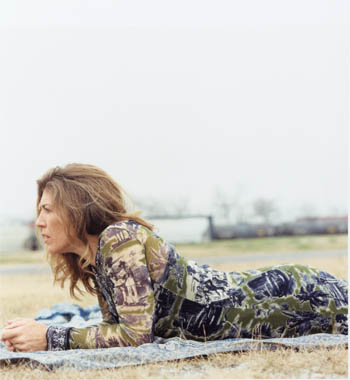
Photograph by Kristin Barlowe
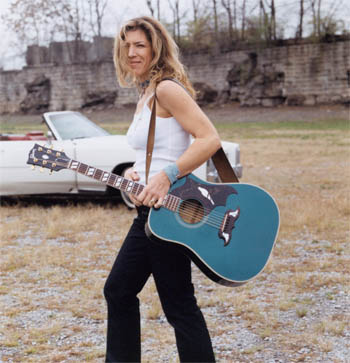
Photograph by Kristin Barlowe
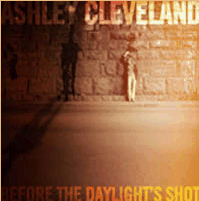
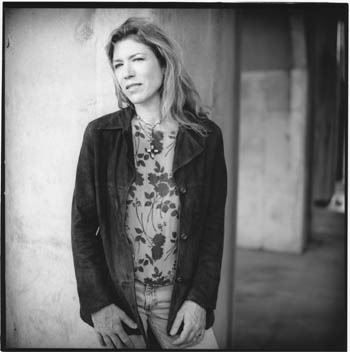
Before the Daylight's Shot, released in 2006, was Ashley Cleveland's seventh solo project.
Photograph by Ben Pearson
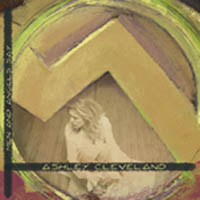
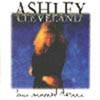
Men and Angels Say, Cleveland's project of hymns, featured her duet with Rock and Roll Hall of Famer and former Traffic member Steve Winwood (of "Roll With It" fame), performing the old standard, "I Need Thee Every Hour."
With the release of Bus Named Desire, Ashley Cleveland earned a Dove award nomination from the Gospel Music Association for "New Artist of the Year." The album included the title track, "Better You Get Ready," "End of a Long Goodbye," "Henry Doesn't Care" and "Skin Tight," a song for which Cleveland was sharply criticized. Some within the industry felt the song was entirely inappropriate . . . too sensual, that is . . . for a Christian recording project.
(Author's note: Didn't God ordain love, intimacy and . . . (gulp) . . . sex between a husband and wife? Some of my fellow Christians should really go back and read the Song of Solomon.)
(Author's note: Didn't God ordain love, intimacy and . . . (gulp) . . . sex between a husband and wife? Some of my fellow Christians should really go back and read the Song of Solomon.)
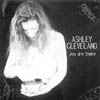
You Are There garnered Ashley Cleveland her second Grammy. The live record included "Gimme Shelter," the Rolling Stones classic she recorded at downtown Nashville's Wildhorse Saloon. On "Your Saving Grace," Cleveland's acoustic guitar playing proves she is more than a great vocalist and masterful songwriter. Buddy Greene's infectious "He Is," featuring a cool electric guitar solo by Kenny Greenberg, proves to be an album highlight. Lastly, "You Don't Have to Take this from Me" is a no-nonsense song Cleveland penned with long-time friend and noted country singer Pam Tillis in response to guys who aren't "fit for commitment, though they swear their love on bended knee."
Mr. Ashley Cleveland?
Not hardly. Cleveland's husband Kenny Greenberg has quite the résumé himself. He is an extraordinary guitarist, songwriter and capable producer. In addition to producing his wife's projects, Greenberg has produced records for southern rocker Edwin McCain and contemporary Christian performer Matthew West. A popular session guitarist, his credits include Toby Keith, Jewel, Indigo Girls, Peter Cetera, Rodney Crowell, Michael Bolton, Lee Ann Womack, Brooks & Dunn, Wynona Judd, Rich Mullins and Trisha Yearwood. Greenberg also co-wrote "House of Love," the hit song Amy Grant recorded with country star Vince Gill.
BIBLIOGRAPHY
Holly Halverson, "Hello Cleveland," CCM, August 1995.
Lucas W. Hendrickson, "Kenny Greenberg: The Embodiment of Cool," CCM, January 1997.
Liz Kelly, "Ashley Cleveland: Live from Cleveland," CCM, December 1998.
Brian Q. Newcomb, "Ashley Cleveland: In the Shadow of Success," CCM, January 1994.
Melissa Riddle, "Lesson for Lambs," CCM, May 2000.
OTHER SOURCES
Telephone conversation with Ashley Cleveland, Nashville, on May 21, 2007
Author: Greg Freeman. Published May 30, 2007.
Holly Halverson, "Hello Cleveland," CCM, August 1995.
Lucas W. Hendrickson, "Kenny Greenberg: The Embodiment of Cool," CCM, January 1997.
Liz Kelly, "Ashley Cleveland: Live from Cleveland," CCM, December 1998.
Brian Q. Newcomb, "Ashley Cleveland: In the Shadow of Success," CCM, January 1994.
Melissa Riddle, "Lesson for Lambs," CCM, May 2000.
OTHER SOURCES
Telephone conversation with Ashley Cleveland, Nashville, on May 21, 2007
Author: Greg Freeman. Published May 30, 2007.
Copyright
Southern Edition
All Rights Reserved
Southern Edition
All Rights Reserved
All materials contained on this site, including text and images, are protected by copyright laws and may not be reproduced without prior written permission from the publisher. Where applicable, use of some items contained on this site may require permission from other copyright owners.
Fair Use of text from SouthernEdition.com is permitted to the extent allowed by copyright law. Proper citation is requested. Please use this guide when citing a Southern Edition article.
Contact Greg Freeman or SouthernEdition.comFair Use of text from SouthernEdition.com is permitted to the extent allowed by copyright law. Proper citation is requested. Please use this guide when citing a Southern Edition article.